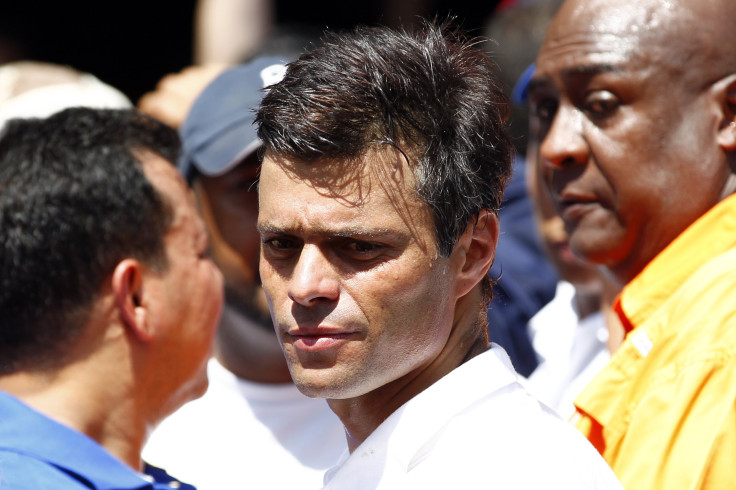
Venezuela is going through some major protests against the government of Nicolás Maduro, and Leopoldo López is one of the heads behind them. He is a leader with Venezuela’s Popular Will opposition party, who’s helped lead the protests in Caracas, calling for the resignation of Maduro. The protesters were met by police, who have used tear gas, water cannons and their weapons against civilians. A number of people have been injured and the death toll has risen to four.
Although students have the driving force behind the demonstrations, Maduro ordered the arrest of López, along with two other opposition leaders. López remained in hiding, delivering video messages from an unknown location.He released a three-minute video statement Sunday calling for a fresh rally against the government in the capital Tuesday and said he would end the march by offering himself up for arrest.
“I have nothing to fear,” López said in the video. “I have committed no crime. I have been a Venezuelan with deep commitments toward my country and my people.”
López, a former mayor of Caracas’s Chacao district, emerged at an opposition protest in a Caracas plaza, where he clambered up onto the pedestal of a statue of Jose Martí and delivered a speech to the crowd before handing himself in to members of the National Guard police picket. López faces charges of terrorism, of which he maintains his innocence. "I present myself to an unjust judiciary. They want to jail Venezuelans who want peaceful, democratic change," he said before handing himself in.
But who exactly is this Leopoldo López who has been making international headlines and has become a headache for Nicolás Maduro?
1) He is well educated. López was born in Caracas on 29 April 1971, the second of three brothers. He studied at the Colegio Santiago de León de Caracas and graduated from The Hun School of Princeton, in Princeton, NJ, USA. He earned a Sociology degree from Kenyon College in Gambier, Ohio in 1993, and subsequently attended Harvard University's Kennedy School of Government where he obtained a Master of Public Policy in 1996. In 2007, he received an honorary Doctor of Laws Degree from Kenyon.
2) Politics runs in his family. López' mother, Antonieta Mendoza, is the daughter of Eduardo Mendoza Goiticoa, who was Secretary of Agriculture from 1945 to 1948. Through her, López is the great-great-great-grandson of the country's first president, Cristóbal Mendoza, and is the great-great-grand nephew of Simón Bolívar.
3) He was the mayor of Chacao from 2000 to 2008. Leopoldo López was elected mayor of Chacao in 2000 with 51% of the vote, and re-elected in 2004, with 81%; the LA Times described him in 2006 as “immensely popular.” However, he was banned from future political activity after his term expired over allegations of misuse of funds. According to the US State Department, the charges were part of “a strategy by the Chávez government to eliminate the political opposition.” López said his real offense is that he poses an electoral threat as he builds a social democratic alternative to the socialist, anti-American “Bolivarian Revolution.”
4) Leopoldo López is concerned about equality. On December 5, 2009, López launched the party Movimiento Voluntad Popular, or Popular Will, which aims to overcome poverty without concentrating more power or eliminating the rule of law. “What we want is to build a new majority from the bottom up - not just through negotiations and agreements between elites. It's a longer road, but for us, it's the only road that gives us possibilities of winning,” he said at the time.
5) Another outcome for Venezuela. He believes that if Henrique Capriles, who ran against Nicolás Maduro for the presidency of Venezuela, had fought the questionable victory of the late Hugo Chavez’s successor, Venezuela would have a different president. “I have no doubt that if Henrique had taken the streets following April 14th [2013], like many of us advised him to do, he would be President right now,” López was quoted as saying.
6) Sometimes being so passionate about your country could have side-effects. According to the BBC, in a 2009 classified cable released by Wikileaks, the political counsellor of the United States embassy in Caracas, Robin D. Meyer, wrote that López had become a "divisive figure within the opposition." "He is often described as arrogant, vindictive, and power-hungry - but party officials also concede his enduring popularity, charisma, and talent as an organizer," the US diplomat wrote.
© 2025 Latin Times. All rights reserved. Do not reproduce without permission.





